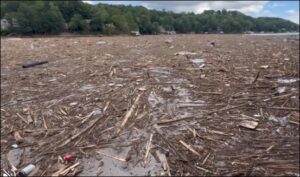By Pam Martens and Russ Martens: September 30, 2024 ~
As an unprecedented humanitarian crisis was happening in real time yesterday morning in Western North Carolina, we turned on the Sunday News programs: CNN’s State of the Union with Jake Tapper and, later in the morning, Face the Nation on CBS. We were stunned that the focus of both programs was the war in the Middle East and the presidential election.
As both national news programs were airing, local news reports were coming out of Buncombe County, North Carolina that people there had no electric power, no running water, no cell phone service, impassible roads, and no distribution centers had been established for bottled water or food because the tractor trailers with the supplies had not arrived — two days after the hurricane hit. At the 10 a.m. press briefing by Buncombe County officials, 10 people were reported dead from Hurricane Helene with 1,000 reported missing. By the 4 p.m. press briefing, the number of deaths from the hurricane in just that one county had tripled to 30 according to Buncombe County Sheriff Quentin Miller, who spoke at both briefings. At that point in time, the deaths in Buncombe County represented more than a third of all deaths being reported by the five states most impacted by Hurricane Helene.
Buncombe County, North Carolina sits 485 miles north of Perry, Florida, the town closest to where Hurricane Helene made landfall as a Category 4 hurricane at 11:10 p.m. on Thursday, September 26. Unprecedented levels of rainfall and surging rivers resulting from the Gulf of Mexico hurricane, led to deaths by drowning and fallen trees from saturated tree roots and heavy winds almost 500 miles away.
Face the Nation on Sunday did include a brief interview with Deanne Criswell, Administrator of the U.S. Federal Emergency Management Agency (FEMA) – who appeared to be living in an alternative universe when she made this statement on the program about “several” homes being destroyed by Hurricane Helene:
“We’re hearing significant infrastructure damage to water systems, communication, roads, critical transportation routes, as well as several homes that have been just destroyed by this. So, this is going to be a really complicated recovery in each of these five states that have had these impacts.”
Hundreds of homes have been reduced to toothpicks by record storm surge. States with major damage from Hurricane Helene include Florida, Georgia, South Carolina, North Carolina and Tennessee.
Early this morning, CBS News reported a total of 116 deaths in all states from Hurricane Helene. Of the 46 deaths reported as of 3:25 a.m. EDT today in the state of North Carolina, Buncombe County deaths represent 65 percent.
One North Carolina county where an official death toll has not yet been announced is Rutherford County, home to the town of Chimney Rock and its sister community, Lake Lure. According to a video posted by a local resident, unprecedented raging waters from the Broad River have completely decimated Chimney Rock, with many homes reduced to toothpicks flowing downstream. The big question for that area is were the people asleep in their now decimated homes when the raging Broad River broke its banks or had they evacuated. According to surviving area residents, they received no evacuation orders or texts.
An unconfirmed report indicates that the area’s pride and joy, the Lake Lure Flowering Bridge, has been destroyed by raging flood waters. Its website describes it as follows:
“The Lake Lure Flowering Bridge is home to more than 2000 species of plants, lovingly tended by local volunteers. From the Bridge, visitors can look upstream to view the famous Chimney Rock, and downstream where the river flows into Lake Lure surrounded by the foothills of the Blue Ridge Mountains. There is always something to see as the plant and garden decorative displays change with the seasons. Visitors often comment on the unexpected blooms that appear at unusual times due to the isothermal microclimate of Hickory Nut Gorge. Even in the coldest months, festive lighting invites a walk across the Bridge both day and night. Our unique gardens are free and open to the public all year. The vast majority of the gardens are wheelchair accessible.”
At the 4 p.m. Buncombe County press briefing yesterday, County Manager Avril Pinder said that search and rescue crews continue to work and that she was aware that there are areas in Fairview, Black Mountain, and Swannanoa “where the devastation is unthinkable” and “loved ones are still trapped.”
Anthony Penland, the Fire Chief of the Swannanoa Fire Department, stated at the 4 p.m. press briefing that entire neighborhoods are gone and search and rescue teams are going to where the neighborhoods once stood and continuing search and rescue operations.
A representative from Duke Energy, the primary electric utility in the area, also spoke at the briefing, saying that some substations are completely underwater and will need complete rebuilding.
It is abundantly clear that Western North Carolina needs immediate assistance from a vastly expanded FEMA effort, a taskforce from the Army Corps of Engineers, a dramatic increase in the National Guard, immediate airlifted water and food supplies, and the immediate establishment of distribution centers for those supplies.




